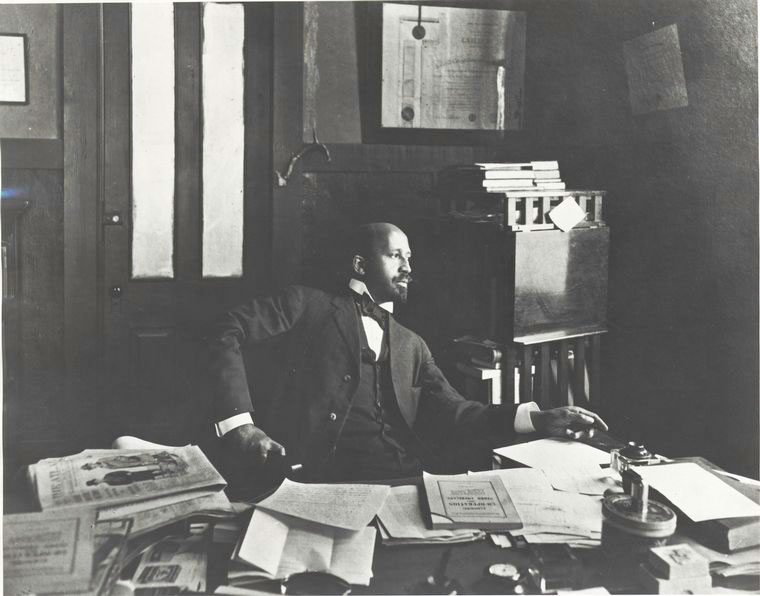W.E.B. DuBois

Credit: New York Public Library
Licence: Unconfirmed copyright status (picture pending replacement with officially public domain)
| Giver: | Individual |
|---|---|
| Receiver: | Other |
| Gift: | Voice/Advocacy |
| Approach: | Other |
| Issues: | 10. Reduced Inequalities, 16. Peace, Justice and Strong Institutions |
| Included in: | Industrial Revolutions, Social Activism |
W.E.B. Du Bois (1868-1963) was an American scholar, public intellectual, author and civil rights activist. A prolific chronicler of the Black experience in the United States, Du Bois remains best known for his landmark collection of sociological essays, The Souls of Black Folk (1903). His pioneering ideas about race, racism and Black consciousness continue to inform and inspire the struggle for racial justice today.
Du Bois’s radical vision of Black liberation informed his ideas about philanthropy and generosity. Distrustful of white industrial philanthropists, he saw their funding for Black colleges and universities as a way of controlling Black intellectual advancement. A committed socialist, Du Bois also espoused a theory of Black economic cooperation as means to self-determination.
Du Bois completed his bachelor’s degree at Fisk University, a historically Black institution in Nashville, Tennessee, in 1888, and went on to become the first African American to earn a PhD from Harvard University in 1895. His experience receiving a liberal arts education convinced him of its potential liberating effects for Blacks with intellectual promise.
Amid a resurgence of systemic racism in the Jim Crow South, Du Bois believed that Black people could only achieve self-determination through agitation and protest. Specifically, DuBois argued that Blacks needed to assert their rightful claim to political power, basic human dignity and access to higher education. The latter, he believed, was necessary to cultivate a “talented tenth” of teachers, professionals and intellectuals who were prepared to lead the Black community in its quest for full citizenship and equal rights.
In declaring this position, Du Bois established himself as an ideological opponent of Booker T. Washington (1856-1915, who advocated a program of conciliation for the masses of Black people descended from slaves. Du Bois derided Washington’s educational philosophy as regressive, designed to relegate Blacks to a permanently inferior caste.
Du Bois also took issue with Andrew Carnegie, John D. Rockefeller and other industrialists, who provided generous funding to Washington’s Tuskegee Institute and other vocational schools in the South. Du Bois criticized their philanthropy as evidence of their bias toward Black technical education, as well as their desire to generate skilled Black laborers for their own business enterprises. Even as philanthropic funding for Black education evolved and broadened over the decades, Du Bois maintained his belief that it was the responsibility of the state, not a minority of wealthy benefactors, to promote and shape education.
By the 1930s, DuBois had become deeply invested in the idea of Black economic cooperation as a means of overcoming cultural division, segregation and poverty. He believed that racial economic solidarity — based on interdependence and mutual aid — would unify the Black community in their fight for civil rights.
With his critique of philanthropy, as well as his insistence on the possibility of cooperation, even in an unjust society, Du Bois staked out a bold intellectual territory — one with which all contemporary philanthropies and movements for social change must still contend.
Contributors: Matt Price, Erin Brown
| Source type | Full citation | Link (DOI or URL) |
|---|---|---|
| Publication |
Gasman, Marybeth. 2002. “W.E.B. Du Bois and Charles S. Johnson: Differing Views on the Role of Philanthropy in Higher Education.” History of Education Quarterly 42 (4): 493–516. |
https://doi.org/10.1111/j.1748-5959.2002.tb00008.x. |
| Publication |
Haynes, Curtis. 2018. “From Philanthropic Black Capitalism to Socialism: Cooperativism in Du Bois’s Economic Thought.” Socialism and Democracy 32 (3): 125–45. |
https://doi.org/10.1080/08854300.2018.1562824. |
| Publication |
Katz, Michael B., and Thomas J. Sugrue, eds. 1998. W.E.B. Dubois, Race, and the City: The Philadelphia Negro and Its Legacy. Philadelphia, Pa: University of Pennsylvania Press. |
- |
| Publication |
DuBois, W. E. B. 1994[1903]. The Souls of Black Folk. Revised ed. edition. New York: Dover Publications. |
- |